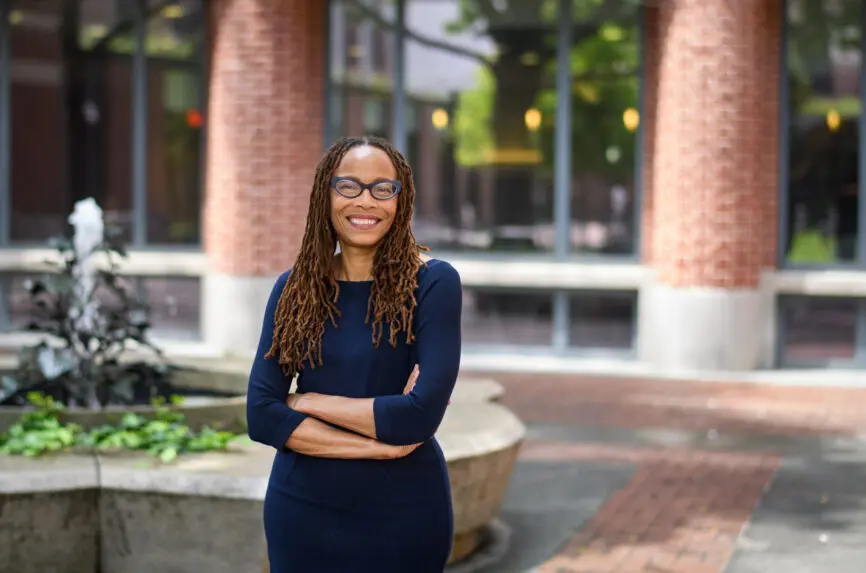Hastings Center News
Bioethics Chats: Dorothy Roberts
Dorothy Roberts, JD, is the George A. Weiss University Professor of Law & Sociology at the University of Pennsylvania and founding director of the Penn Program on Race, Science & Society. She is a Hastings Center Fellow who received a MacArthur “genius award” Fellowship last year. The MacArthur Foundation commended her for “exposing racial inequities embedded in social service systems and uplifting the experiences of people caught up in them.” Roberts chatted with Vardit Ravitsky about the “trifecta of violations of reproductive justice” and what bioethicists and healthcare providers should do. The conversation has been edited for clarity.
Vardit: What is top of mind for you in bioethics today?
Dorothy: Top of mind for me is the way in which the Dobbs decision spotlights the entanglement of three ethical issues: the right to abortion, the criminalization of pregnant people, and family separation.
Here’s what I mean by this entanglement. As states mounted legislative assaults on access to abortion, they were simultaneously constructing a legal apparatus to charge pregnant people criminally for putting their fetuses at risk, including pregnancy losses like stillbirths and miscarriages. At the same time, we have seen a buildup of family policing. So, the hardships that abortion bans are imposing on people who keep their babies will be another avenue for family separation. This trifecta of violations of reproductive justice is very concerning now.
Vardit: Would you give some examples of how this trifecta of violations plays out in medicine and law?
Dorothy: Hospitals routinely screen newborns for evidence of their mother’s drug use during pregnancy and report positive results to child protection authorities. So, the promotion of the view of the fetus as a person to be protected by the state becomes grounds for compelled pregnancy, but also for criminalizing pregnancy and expanding family policing.
Doctors, nurses, and other healthcare professionals have been forced into these bioethical violations. Doctors in states that ban or heavily restrict abortion are afraid to provide abortion care to pregnant people who need it for fear of being prosecuted. And, as mandated reporters, many also feel compelled to report fetal neglect to child protective services.
But doctors should be at the forefront of a campaign to end these bioethical violations—to end the criminalization of abortion and the criminalization of fetal abuse and pregnancy, and to end family policing, to end the punishment of marginalized people for failing to take care of their children. Doctors should provide the supports, including healthcare supports, that families need.
Vardit: How do you see the intersection between these three reproductive justice issues and issues of race in this country?
Dorothy: The devaluation of Black women’s childbearing and reproductive autonomy–from the time of slavery, through welfare restructuring, to the prosecutions of Black mothers– has shown us the way in which restrictions on abortion, criminalization of pregnancy, and family policing are all entangled. Black mothers are the ones who are most at risk for government intervention in all three of these areas. And so, we cannot understand these violations and the resistance against them without putting a focus on both the devaluation of Black women’s reproductive autonomy and their long-standing fight against this devaluation.
Vardit: Say a bit about your last book, Torn Apart, and how it was received.
Dorothy: Torn Apart is a call for dismantling the current child welfare system because of the harms that it inflicts on children and families and replacing it with an approach that truly improves children’s welfare and safety by supporting families. I call Child Protective Services a form of family policing because it so intensely supervises, regulates, and terrorizes families without providing the support that families need.
My book had a mixed reception. I had a lot of interest and support from doctors and other healthcare providers who feel that they’ve been conscripted into helping a system that actually harms their patients. They feel, through mandated reporting laws, that instead of getting support to help their patients, they have to turn their patients over to a harmful system.
I also got some pushback from people who find it difficult to imagine how we could protect children without child protective services. But I chalk that up to either ignorance about how the system actually operates, the harms that it inflicts on children and their families, and an unwillingness to change.
Vardit: You’re so exceptionally productive. What do you do to wind down?
Dorothy: I love to travel. And I’m working on a memoir and so I’ve become interested in memoirs. I listen to them and read them as much as I can. A good memoir isn’t just an autobiography. It also has a theme to it, it has insights. So, I find that when people write honestly and openly about their lives, that it is always very revealing and causes me to reflect on aspects of my life as well.
Vardit: With everything that’s happening in the world today, what advice can you give to early-career scholars who want to make a difference?
Dorothy: My advice is, don’t give up because of the hurdles–which are more intense today than I’ve ever seen in my entire career. And make sure to work in solidarity with other people who have your values and are working toward the same ends. You learn so much when you align with other people, but you also get the inspiration and the motivation and the support that you need. They can be people at a university—classmates, colleagues—and people who are working outside of academia who are organizing at the grassroots level or at the local, state, and national level to achieve the justice that you’re also hoping to achieve.
Vardit: Thank you very much for these insights. I’m sure they will be much appreciated by the new generation.

